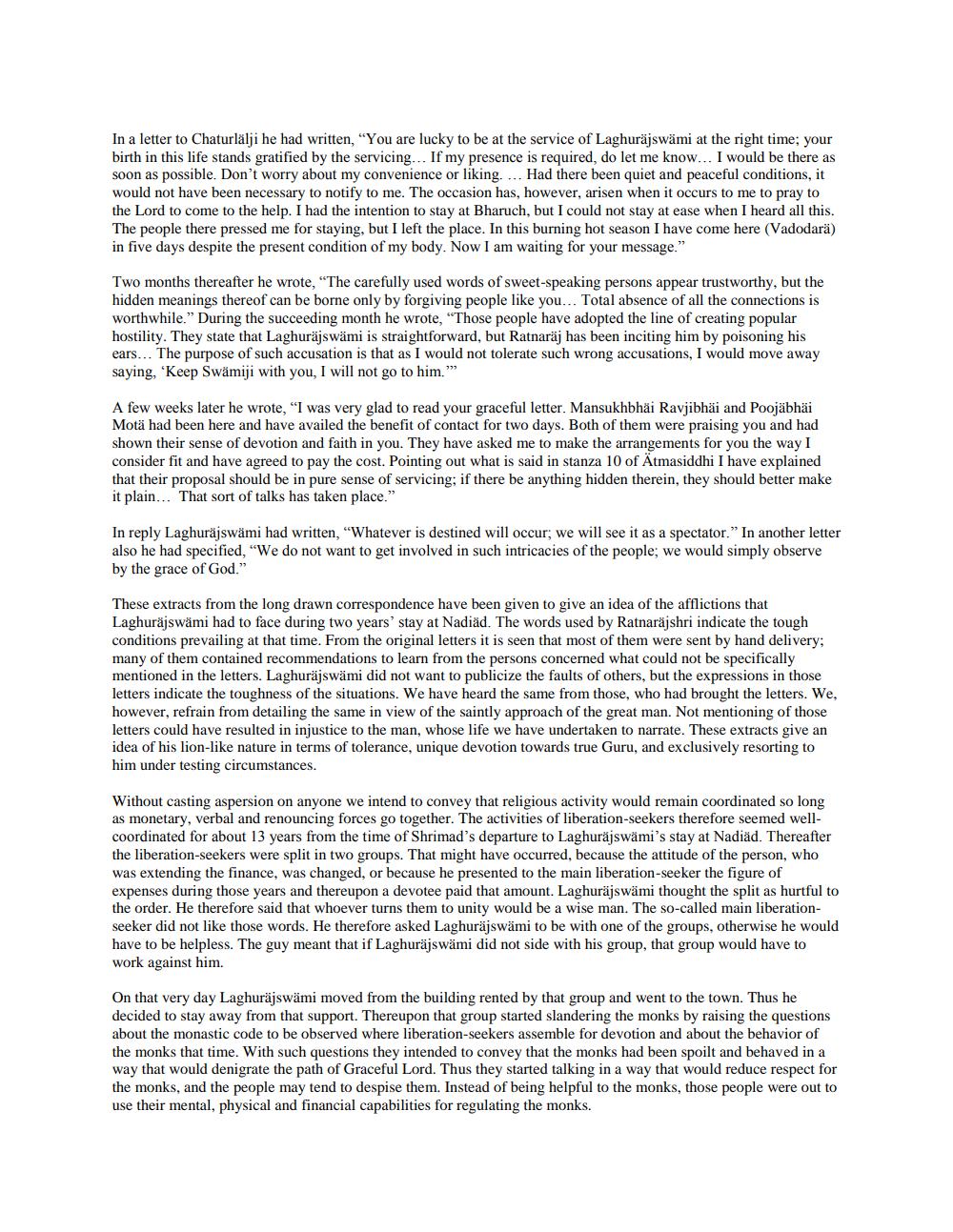________________
In a letter to Chaturlälji he had written, “You are lucky to be at the service of Laghuräjswämi at the right time; your birth in this life stands gratified by the servicing... If my presence is required, do let me know... I would be there as soon as possible. Don't worry about my convenience or liking. ... Had there been quiet and peaceful conditions, it would not have been necessary to notify to me. The occasion has, however, arisen when it occurs to me to pray to the Lord to come to the help. I had the intention to stay at Bharuch, but I could not stay at ease when I heard all this. The people there pressed me for staying, but I left the place. In this burning hot season I have come here (Vadodara) in five days despite the present condition of my body. Now I am waiting for your message."
Two months thereafter he wrote, "The carefully used words of sweet-speaking persons appear trustworthy, but the hidden meanings thereof can be borne only by forgiving people like you... Total absence of all the connections is worthwhile." During the succeeding month he wrote, “Those people have adopted the line of creating popular hostility. They state that Laghuräjswämi is straightforward, but Ratnaraj has been inciting him by poisoning his ears... The purpose of such accusation is that as I would not tolerate such wrong accusations, I would move away saying, 'Keep Swamiji with you, I will not go to him."
A few weeks later he wrote, “I was very glad to read your graceful letter. Mansukhbhai Ravjibhäi and Poojäbhäi Motä had been here and have availed the benefit of contact for two days. Both of them were praising you and had shown their sense of devotion and faith in you. They have asked me to make the arrangements for you the way I consider fit and have agreed to pay the cost. Pointing out what is said in stanza 10 of Atmasiddhi I have explained that their proposal should be in pure sense of servicing; if there be anything hidden therein, they should better make it plain... That sort of talks has taken place."
In reply Laghuräjswämi had written, "Whatever is destined will occur, we will see it as a spectator." In another letter also he had specified, "We do not want to get involved in such intricacies of the people; we would simply observe by the grace of God."
These extracts from the long drawn correspondence have been given to give an idea of the afflictions that Laghuräjswämi had to face during two years' stay at Nadiad. The words used by Ratnarajshri indicate the tough conditions prevailing at that time. From the original letters it is seen that most of them were sent by hand delivery; many of them contained recommendations to learn from the persons concerned what could not be specifically mentioned in the letters. Laghuräjswämi did not want to publicize the faults of others, but the expressions in those letters indicate the toughness of the situations. We have heard the same from those, who had brought the letters. We, however, refrain from detailing the same in view of the saintly approach of the great man. Not mentioning of those letters could have resulted in injustice to the man, whose life we have undertaken to narrate. These extracts give an idea of his lion-like nature in terms of tolerance, unique devotion towards true Guru, and exclusively resorting to him under testing circumstances.
Without casting aspersion on anyone we intend to convey that religious activity would remain coordinated so long as monetary, verbal and renouncing forces go together. The activities of liberation-seekers therefore seemed wellcoordinated for about 13 years from the time of Shrimad's departure to Laghuräjswämi's stay at Nadiad. Thereafter the liberation-seekers were split in two groups. That might have occurred, because the attitude of the person, who was extending the finance, was changed, or because he presented to the main liberation-seeker the figure of expenses during those years and thereupon a devotee paid that amount. Laghuräjswämi thought the split as hurtful to the order. He therefore said that whoever turns them to unity would be a wise man. The so-called main liberationseeker did not like those words. He therefore asked Laghuräjswämi to be with one of the groups, otherwise he would have to be helpless. The guy meant that if Laghuräjswämi did not side with his group, that group would have to work against him.
On that very day Laghuräjswämi moved from the building rented by that group and went to the town. Thus he decided to stay away from that support. Thereupon that group started slandering the monks by raising the questions about the monastic code to be observed where liberation-seekers assemble for devotion and about the behavior of the monks that time. With such questions they intended to convey that the monks had been spoilt and behaved in a way that would denigrate the path of Graceful Lord. Thus they started talking in a way that would reduce respect for the monks, and the people may tend to despise them. Instead of being helpful to the monks, those people were out to use their mental, physical and financial capabilities for regulating the monks.




